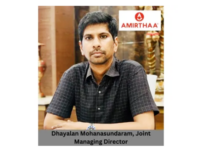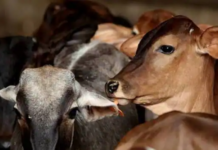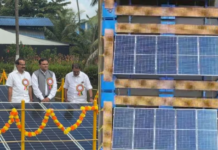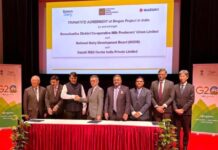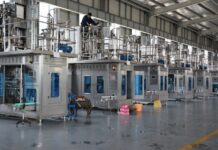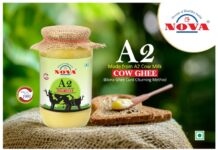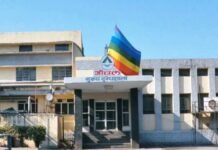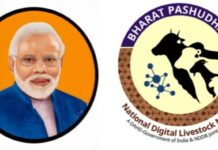Petaluma, October 29, 2021: Straus Family Creamery‘s founder Albert Straus and seaweed-supplement maker Blue Ocean Barns demonstrated a dramatic climate change solution, reducing dairy cows’ enteric methane emissions an average of 52 percent, and as much as 90 percent, by supplementing their diets with a specific red seaweed (Asparagopsis taxiformis). These reduction results were part of the first commercial trial in the United States using this red seaweed on a dairy farm, illustrating that innovative dairy farming can substantially reduce its climate impact.
Straus Family Creamery Founder and CEO Albert Straus received approval from the United States Department of Agriculture (USDA) National Organic Program and California Department of Food and Agriculture (CDFA) to conduct the trial on his California organic dairy farm. This is the largest and longest study of the red seaweed supplement for dairy cows.
The enteric methane emissions of twenty-four cows on the Straus Dairy Farm were tested four times a day to determine the impact of adding roughly one-quarter pound of red seaweed each day to their regular 45-pound diet for a total of 50 days in August and September. During the trial, enteric methane emissions were reduced an average of 52 percent, and as much as 90 percent. Five metric tons of carbon dioxide equivalent emissions were averted in seven weeks from these 24 cows.
Enteric fermentation (cow burps) is responsible on average for 35 percent of total U.S. on-farm greenhouse gas emissions from dairy cows and the production of their feed supply. Cows belch methane gas as a normal part of a healthy digestive process. But methane is a greenhouse gas 34 times more potent than carbon dioxide (CO2). A productive Holstein cow burps about the same emissions as one car’s tailpipe, roughly one ton of CO2e every three months.
“If we can get up to 90 percent reduction in methane emissions through feeding red seaweed to cows, this is a huge leap forward for us in creating a sustainable farming system that is beneficial to the planet and our communities,” said Albert Straus. “Red seaweed is also the next critical step we need to reach our carbon-neutral farming model goal in 2023 on the Straus Dairy Farm. This model will demonstrate that dairy farming and animals are one of the essential climate change solutions we need while providing high-quality organic food.”
California is the number one milk producer in the United States and is responsible for the most dairy farm emissions. The state must reduce dairy methane by 40 percent over 2013 levels by 2030 to meet its climate goals.
“Red seaweed immediately and radically drops enteric methane emissions –and an immediate and radical solution is what the planet needs right now,” said Joan Salwen, Co-Founder and CEO, Blue Ocean Barns. “We need to install electric vehicle charging stations throughout the country and replace coal plants with cleaner energy. But the Blue Ocean Barns seaweed solution is ready right now, it goes to work on climate change immediately, and it is economical.”
Before 2018, no solutions for dramatically reducing burped emissions had been proved in live cows. However, in the past three years, university research has proved that adding just a few ounces of the red seaweed to cows’ diets naturally reduces enteric methane gas production. A UC Davis study published in the peer-reviewed scientific Journal of Cleaner Production, which the Straus Dairy Farm and Blue Ocean Barns study successfully replicated, showed greater than 50 percent methane emissions reduction in dairy cows. Additional studies have demonstrated that the seaweed does not affect cow herd health, milk production, or the taste and chemistry of the milk according to the reports published in businesswire.com.
Organic Farmer Albert Straus has always actively worked to find agriculture-based climate solutions on his farm by prioritizing sustainable organic farming practices, converting cow manure to biogas via a methane digester, implementing carbon farming to improve soil health, and using on-farm electric vehicles. Together, the seaweed feed and the methane digester will reduce methane emissions by 90 percent, helping Albert Straus meet his goal of creating a net carbon neutral farming model on his dairy farm by 2023. He plans to extend the model by the end of the decade to the supplying Straus Family Creamery dairy farms and beyond.
After the Straus Dairy Farm reaches carbon neutrality, the milk produced on the farm and processed at Straus Family Creamery will have a low climate impact comparable to non-dairy milk alternatives. Reducing the climate impact of organic dairy milk is imperative to fulfilling Straus Family Creamery’s mission to sustain family farms and revitalize rural communities.
Watch Albert Straus of Straus Family Creamery and Joan Salwen of Blue Ocean Barns on video here.



